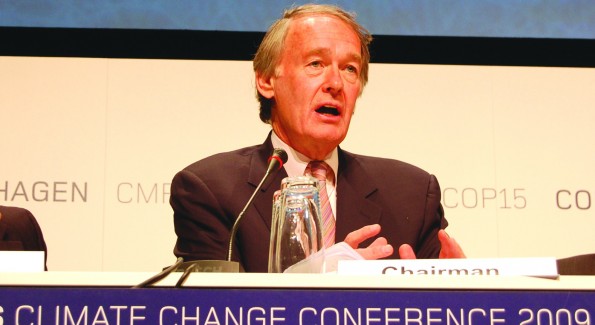Rep. Edward J. Markey (D-Mass.), Chairman, Select Committee on Energy Independence and Global Warming, on the historic Copenhagen climate conference and the future of clean energy legislation.
In late December, just a few hundred miles south of the Arctic Circle, I stood backstage with President Barack Obama as he prepared to address the representatives of 192 countries at the Copenhagen climate conference. Before his arrival, the talks had gone from fluid to frozen. The Chinese delegation had gone ice cold, refusing to negotiate. Outrageous comments from a Sudanese representative were threatening to turn the conference into a circus.
Yet, in that moment, I saw a president who was resolute, strong, and determined to complete an agreement.
A few hours later, Air Force One went wheels up, headed back to Washington. Following intense negotiations between the United States, China, India, Brazil, and South Africa, President Obama had forged the Copenhagen Accord that has now put 139 countries on record that they will cut heat-trapping emissions.
Our president took a climate deal many considered dead in the water and created a watershed moment in the global effort to combat climate change.
And while the re-establishment of American international legitimacy had surely started on January 20, 2009, the power to negotiate with the rest of the world on clean energy and climate change came when the House of Representatives passed the Waxman-Markey clean energy jobs bill on June 26, 2009.
This bill is our American Accord to end our dangerous dependence on imported oil and polluting sources of fuel.
In nine months, the next round of climate negotiations will occur in Mexico, which is about as close to the Tropics as Copenhagen is to the Arctic.
And yet the pundits are still frigid in their predictions for American success on clean energy and climate issues. They are wrong.
The passage of health care was a difficult task. Yet its success revealed that America’s appetite for progress on generational challenges has not abated.
Right now, there is a tri-partisan effort in the Senate to construct their version of our House bill. Senators John Kerry (D-Mass.), Lindsey Graham (R-S.C.) and Joe Lieberman (I-Conn.) will soon introduce their bill. Republican Susan Collins (Maine) is working with Democrat Maria Cantwell (Wash.) on a bill. And unlike health care, which gained zero Republican votes in the House, Waxman-Markey was a bi-partisan victory.
Once the choice is made clear between foreign oil and American energy, between the health of our planet or the wealth of OPEC, Senators will vote for clean energy jobs.
After the Senate bill has passed, Speaker Pelosi, Rep. Waxman, and I, along with other House leaders, can work out our differences with the Senate legislation and put a final version on President Obama’s desk. In one year, Congress will have addressed the health of our people, the health of our economy, and the health of our planet.
The political and planetary effects of climate change and oil dependence stretch from the Arctic to the Amazon. This year, 40 years after the founding of our Environmental Protection Agency by a Republican president, we will realize our place in history and pass clean energy and climate legislation for this generation, and countless more to come.





